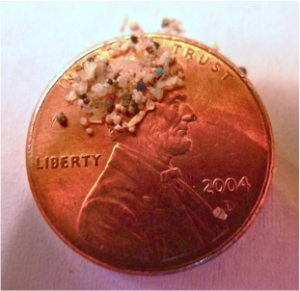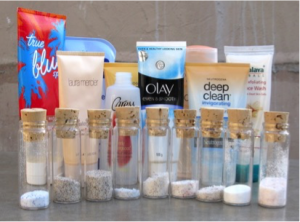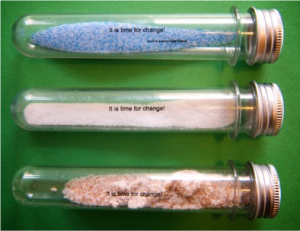By Lindsey Sagasta ’16 (Environmental Biology Major from Buffalo, NY)
Last November I published a piece about microplastics in marine environments as a result of consumer hygiene products like toothpastes, body scrubs, and face washes. Essentially, these miniscule plastic microbeads cannot be filtered out of the water during sewage treatment. Enough plastic microbeads enter our water each day to cover eight football fields, over eight trillion single beads, currently concentrated at 1.7 million microplastic pieces for each square mile of the Great Lakes. Once in the water, the microbeads “become a magnet for toxins,  such as dioxins and volatile organic chemicals found in our waters due to pesticides and industrial pollution.” The toxins are absorbed through the tissue of species that ingest the plastics, then biomagnified across the food web, and at the top trophic level, humans will be exposed to the highest concentrations of toxins.
such as dioxins and volatile organic chemicals found in our waters due to pesticides and industrial pollution.” The toxins are absorbed through the tissue of species that ingest the plastics, then biomagnified across the food web, and at the top trophic level, humans will be exposed to the highest concentrations of toxins.
Earlier in 2014, Illinois was the first state to ban the microbeads in personal care products due to their extensive damage to our skin and the environment, followed by Colorado, Indiana, Maine, Maryland, and New Jersey. Although these early legislations have jump-started the proposal of bans in other states, they have actually hindered the successful passing of bills in some assemblies. Further, these early bans include a “loophole” that allows corn-based plastic microbeads to be exempt because they are biodegradable. Despite “biodegradable” sounding environmentally friendly, corn-based products can only degrade at a very high temperature after a long period of time. Thus, these bans are allowing companies to green wash their products – a way corporations are trying to look green, but aren’t really being green – by including biodegradable plastic although it is just as harmful.
 Fortunately, California passed a law in October that should ultimately set a nation wide stringent standard for plastic microbead production. Governor Jerry Brown approved Assemblyman Richard Bloom’s (D- Santa Monica) measure that will place a ban on exfoliating microbeads in personal care products as of January 1st, 2020. The passage of this law in California is a large step forward for environmentalists, according to this article, “When California bans something, because it’s a leader in the consumer products world, it tends to start a swell of changes across the industry.” Being the most populated state, it is easier for corporations to just remove the beads instead of designing a separate product to be sold only where bans are in place. As well, this specific ban does not include the loophole, setting an example for states that are in the process of passing legislation.
Fortunately, California passed a law in October that should ultimately set a nation wide stringent standard for plastic microbead production. Governor Jerry Brown approved Assemblyman Richard Bloom’s (D- Santa Monica) measure that will place a ban on exfoliating microbeads in personal care products as of January 1st, 2020. The passage of this law in California is a large step forward for environmentalists, according to this article, “When California bans something, because it’s a leader in the consumer products world, it tends to start a swell of changes across the industry.” Being the most populated state, it is easier for corporations to just remove the beads instead of designing a separate product to be sold only where bans are in place. As well, this specific ban does not include the loophole, setting an example for states that are in the process of passing legislation.
Michigan and New York, two of the Great Lakes states, are in the process of passing their own bans. In Michigan, the passage of the ban is struggling to stray from the loophole precedent set by the earlier states. The Michigan Chemistry Council currently backs it, but some lawmakers and environmental groups are fighting for more stringency. New York has been having issues passing legislation too. In 2014, the NYS Assembly voted 133-1 to ban microbeads in products, but it never made its way to the State Senate. The next year, the Assembly  overwhelmingly voted 139-0 in favor of the ban, but again it never reached the floor in the Senate. However, NYS counties have begun taking the matter into their own hands. In August 2015, Erie County unanimously passed its own ban, with many other counties following suite, including Albany, Cattaraugus, Chautauqua, Monroe, and Niagara.
overwhelmingly voted 139-0 in favor of the ban, but again it never reached the floor in the Senate. However, NYS counties have begun taking the matter into their own hands. In August 2015, Erie County unanimously passed its own ban, with many other counties following suite, including Albany, Cattaraugus, Chautauqua, Monroe, and Niagara.
Federally, in March 2015, Representative Frank Pallone (D-N.J.) introduced a federal ban on microbeads in the U.S. House. Although it stalled out, it notably gathered 36 bipartisan cosponsors and drifted through a committee vote. More recently, Kirsten Gillibrand (D-N.Y.) introduced a companion bill in the Senate called the Microbead Free Waters Act of 2015 to ban the microbead nationally.
Here’s how you can help The Microbead Free Waters Act of 2015: Send a letter in support of this act to your Senators and Congressman. The Huffington Post suggests you go to Oh Say Nation, a website that facilitates emailing lawmakers on issues that matter to you. Also, check out 5gyres.org to sign their petition and learn more!
All photos courtesy of http://www.5gyres.org/media-kit/.

